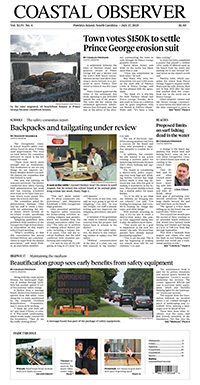Sales tax
Commission ready to travel after vote fails to halt its work

Two members of Georgetown County Council say the commission that will prepare a list of projects for a capital projects sales tax referendum doesn’t understand the needs of the western part of the county.
“I could name 20 communities right now. Very few on the committee would even know what part of the county they’re in, much less their needs,” Council Member Raymond Newton said.
But in a 4-3 vote last week, the council decided that the proof of how well the six-member commission understands the needs will be in the ballot question it is due to deliver to County Council by the end of April. If it doesn’t address needs in all parts of the county, the council can keep the referendum off November ballot, Council Chairman Louis Morant said.
The tax is expected to raise $10 million a year over eight years.
Newton and Council Member Everett Carolina proposed to rescind the resolution that created the sales tax commission, which is required by state law before the 1-cent tax can be presented for voter approval. Council Member Bob Anderson supported the effort, he said, because he didn’t support the initial resolution. He wants the county to adopt a transportation sales tax.
Under state law, the council made three appointments to the commission. The city of Georgetown made two. Neither Andrews nor Pawleys Island had enough population in the 2020 census to qualify for a seat, so the two Georgetown appointees picked the final member: Mark Hawn, who was nominated by Pawleys Island Town Council. He was elected to chair the commission.
As a result, Newton said 18,000 residents in his Council District 5 and Carolina’s District 3 lack representation.
“It’s our fault for believing the commission would do the right thing. We take the blame for that,” Newton said.
Andrews had an appointee in 2012 when a capital projects sales tax failed, and in 2014, when a tax was passed. A tax didn’t reach the ballot in 2020, but the commission that year was chaired by the Andrews mayor’s wife.
“The issue is getting representation for the town of Andrews,” Carolina said.
Newton said the town only accounts for 17 percent of the population in the two council districts. He is concerned about wider representation for the rural areas. Only one member of the commission lives outside the Waccamaw Neck or Georgetown.
“The needs of the western part of the county are so different from the Waccamaw Neck and Georgetown,” he said. “We have people that can’t even drink water out of their own faucet. Every time it rains they go two or three days without being able to use their bathroom.”
While Newton added that he respects the commission members and their willingness to serve, they “cannot even begin to comprehend that because they’re not familiar with the area.”
Although the commission has not formally adopted a process for submitting capital projects for its review, it has agreed that those projects must be submitted by the governmental entity that will actually complete the project. That is a change from past sales tax efforts.
“Nonetheless, we are making every effort to understand the entire community and honor our commitment to being transparent, thorough and inclusive. This is why we are rotating our weekly meetings around the county and welcome anyone who would like to attend,” Hawn said this week.
He met with officials in Andrews last week and toured facilities even before County Council took up the commission’s fate. The commission will meet Jan. 25 at the Andrews Library.
By rescinding the resolution that created the commission, “we won’t get the opportunity to see what type of projects will be presented, won’t get the opportunity to see whether all sections of the county would be adequately represented,” Morant told the council.
Even if the proposed projects include the rural areas, the process has been tainted, Newton said.
Along with the capital projects tax, the county plans to ask voters to approve a 1-cent local option sales tax. Revenue from that would be used primarily to reduce property taxes, but it would also generate an estimated $2.2 million that the county could use to operate and maintain facilities constructed under the capital projects sales tax.
Without support for the capital projects tax in the rural districts, the local option tax is at risk, Newton said.
By scrapping the capital projects tax, the county could improve the chances for passing the local option tax, he said.
That would allow the county to come back in 2026 with another capital projects tax with different representation, Newton said.
“The issue is appearance,” Carolina said. “We have major issues.”
“You’re making an assumption,” Morant said.
“It’s no assumption. It’s reality,” Carolina said.
After meeting in Andrews, the commission will meet Feb. 1 in Carvers Bay
“We have learned from our research of the other S.C. counties that the project list has to be balanced,” Hawn said.




